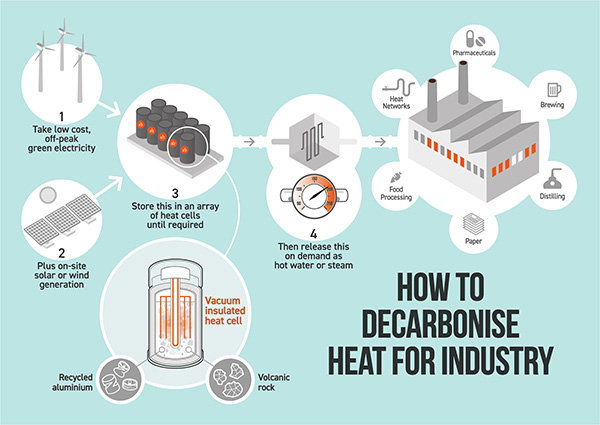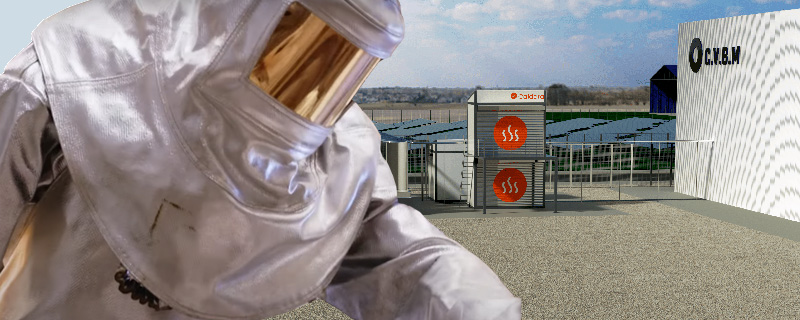CUTTING COSTS & MEETING FUTURE DEMAND
Heat storage specialist Caldera has engaged the Manufacturing Technology Centre (MTC) to design a heat cell gigafactory to mass manufacture its unique low carbon heat storage system at scale. The company plans to commence commercial production in 2025 and scale up rapidly thereafter, with thousands of heat cells being rolled out UK-wide.
In June, Caldera was awarded £4.3 million from the UK Government to develop its groundbreaking industrial heat storage technology – which takes cheap, green off-peak electricity and onsite solar and stores it in heat cells made of scrap aluminium and volcanic rock, ready to be released as hot water or steam when required.
The heat pioneers have already piloted the technology in homes across the south of England, where small-scale boilers delivered low carbon hot water and heating to a number of domestic customers.
Caldera is using the £4.3 million fund to build a full-scale industrial electric storage demonstrator – comprising up to 20 heat cells – at its base in Hampshire. The demonstrator will deliver process steam between 80 and 200℃, the ideal temperature for around 31 percent of the UK’s total industrial heat demand, in sectors including pharmaceuticals, food manufacturing and brewing.
The Manufacturing Technology Centre specialises in advising business on the latest manufacturing techniques and Caldera has now brought the MTC on board to design a new gigafactory to mass produce its electric boiler for a UK and global market.
“To date, all of our manufacturing has been on a near-bespoke unit-by-unit basis which is labour intensive with a high unit cost,” states Caldera CEO James Macnaghten.
“In order to drive down costs and meet growing future demand we need to explore how we can scale rapidly and automate as many processes as possible. A great benefit of our system is it is modular – our electric boiler is made up of multiple highly insulated cells, each of which is relatively small at around two metres high – and this really lends itself to manufacturing at scale,” James says.
Caldera has engaged the Manufacturing Technology Centre to define an efficient and lean method of manufacturing (MoM) and assembly for high volume production, to design a suitable factory layout and simulate in 3D the manufacture and assembly sequence of the product as a ‘virtual build’.
It is anticipated this will include automated production with robotics and state-of-the-art-processing. Work on the project has commenced already and will complete in late 2024 – giving Caldera a greenprint for production facilities which can be built in the years ahead.

“Industry is a major user of heat, and typically this is provided by steam boilers that burn gas or oil,” James continues.
“Our product delivers process heat at the sweet spot which many industries need. With continuing pressure to decarbonise we believe there will be strong global demand for Caldera’s electric storage boiler which offers a low cost, low carbon alternative to fossil fuel.
“Our partnership with the MTC will enable us to design a gigafactory with the very best technologies and processes baked in. Once demand for our product has risen sufficiently, we will then be able to build the facilities we need to scale up rapidly and roll out a commercial product with a vast potential market worldwide,” James concludes.
MTC’s Director of Power and Energy Matthew Kite said:
“We are delighted to be supporting Caldera in such a high-profile project, to rapidly automate and upscale their processes, ultimately in support of decarbonisation.
“We have a proven record across many different industrial sectors in defining efficient manufacturing operations and management (MOM) and assembly for volume production and this project aligns perfectly with the MTC’s support of the UK’s drive to ‘net zero’, where we are also working in many sectors such as hydrogen, nuclear power, offshore and onshore wind and in clean maritime.”








Leave a Reply
Want to join the discussion?Feel free to contribute!